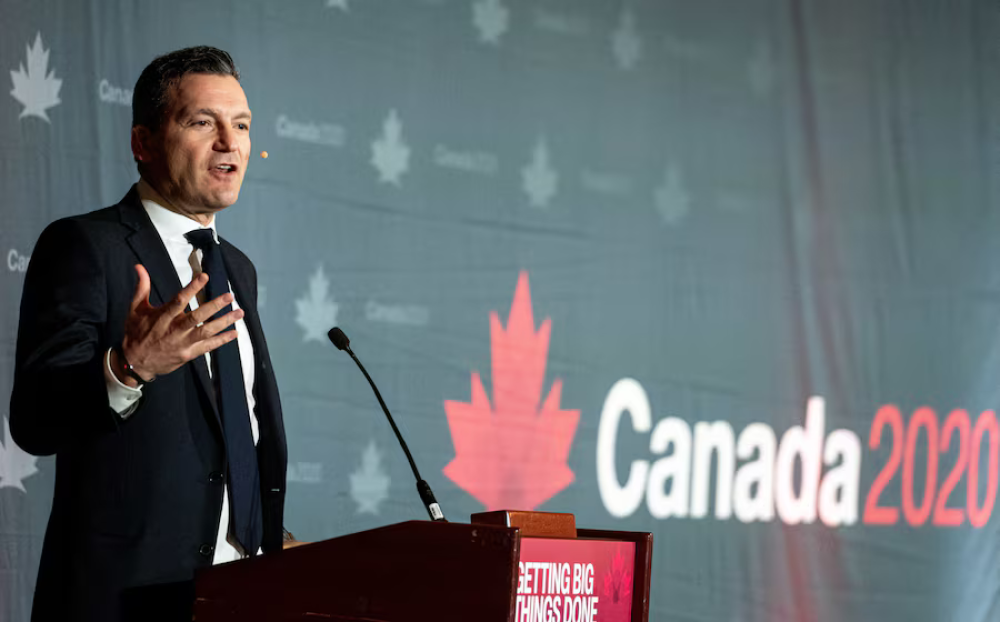The federal minister of
artificial intelligence said building large AI companies is an “urgent issue” for Canada, but added that the country has to work with foreign companies and partner with other nations to secure the necessary capital to build out its AI sector.
“We need to really pick the companies that have the potential to scale,” Evan Solomon told The Globe and Mail in an interview Tuesday.
One way the government can do that is through its procurement policies, buying products and services from Canadian companies to help them grow. Canada has also committed to meeting NATO’s 2-per-cent military spending target this fiscal year, and Mr. Solomon said part of that spending will go toward supporting Canadian AI and quantum computing companies developing technology that has both commercial and defence applications.
“Having secure cloud and secure data centres is a vital tool for national defence, so we’re not vulnerable to companies that can shut down or take the data or have access to it,” he said.
Mr. Solomon, a rookie MP and former journalist who represents the riding of Toronto Centre, was appointed the country’s first Minister of AI and Digital Innovation in May. Prime Minister
Mark Carney has made AI a priority,
citing the technology’s potential to make the federal government more efficient and create new jobs for Canadians.
Mr. Solomon said his priorities as minister are to help AI companies scale, boost adoption, increase trust and build sovereign data centres to power the technology.
The federal government has long invested to support AI research, but the country has
largely failed to commercialize the technology and benefit economically. Canada also lacks the huge, multibillion-dollar data centres necessary for running AI models and applications.
There is a global race to procure computer chips and construct data centres, and
more than half of the world’s most powerful facilities are located in the United States, China and the European Union.
Last year, the federal government announced a $2-billion package to help companies access and build data centres here. “It’s not nothing,” Mr. Solomon said, but added Canada will also have to partner with other nations to secure AI investment. A single data centre for AI can cost billions of dollars.
“Sovereignty does not mean solitude,” he said. “It does not mean we’re trying to have some phantasmagorical idea that everything in the stack from top to bottom is Canadian.” Mr. Solomon cited needing to work with France, Germany, the United Kingdom and the United States. He also met with a delegation from the United Arab Emirates earlier this month to discuss opportunities for AI investment.
Securing capital from Saudi Arabia is also a possibility, he said, though he has not had any formal talks with officials. The country has
created a US$100-billion fund to spend on AI, and Crown Prince Mohammed bin Salman launched an AI company called Humain that will
develop AI infrastructure, among other technologies.
“Diplomatic ties and investment does not mean you agree with governments,” Mr. Solomon said. “We can’t look at AI as a walled-off garden. Like, ‘Oh, we cannot ever take money from X or Y.’”
The government has made one announcement through its $2-billion AI infrastructure package so far, allotting up to $240-million to Toronto-based Cohere Inc., which builds large language models. The deal has been
criticized by some experts in the industry who argue it cannot be considered sovereign because Cohere will spend the funds at a data centre in Canada
operated by CoreWeave Inc., an American company.
“What I don’t want to do is a purity test on sovereignty. The main thing is keeping a company that’s Canadian headquartered in Canada,” Mr. Solomon said. “Cohere is a prize that any country would like.”
Large data centres have enormous energy requirements, too, and provinces with clean electricity grids are facing supply constraints and have to be careful about
allotting capacity. Alberta is trying to attract data-centre operators to power facilities with
natural gas, which produces emissions.Mr. Solomon said emissions can be mitigated with carbon capture and storage. “This Prime Minister has signalled we are going to build big things, and we are going to build energy systems across the spectrum,” he said.
“The climate has changed. The U.S. and the Chinese regard all forms of regulation as a constraint on national security and innovation,” he told The Globe. “We haven’t landed on what legislative framework we’re going to put forward, but you can safely say that we’re not trying to push the same rock up the same hill.”
The act received criticism from companies that argued it would stifle innovation, and from civil society groups who said it was vague and that enforcement measures lacked teeth. Mr. Solomon declined to identify anything specific about the act that makes it inappropriate to bring it forward again today.
“I don’t want to legislate publicly like this. It’s a really bad practice for a minister to come in five weeks in and tell people what we will or we won’t do yet,” he said. “We’re not abandoning regulation. We’re looking at it.”
Copyright reform will be another issue for Mr. Solomon to tackle. Artists, writers and other creatives have said that training commercial AI models on their content without consent or payment is unethical and unlawful, while AI companies have told the government they prefer an
explicit exemption in the Copyright Act to be allowed to do so.Mr. Solomon said the government is committed to “making sure that our culture makers are protected” but that “we are not planning a copyright piece of legislation right now.”
The federal government has already completed a consultation about generative AI and copyright, but with
multiple court cases playing out
over the issue, Mr. Solomon said the government wants to be “aligned with the market signals to how content creators are compensated.”




